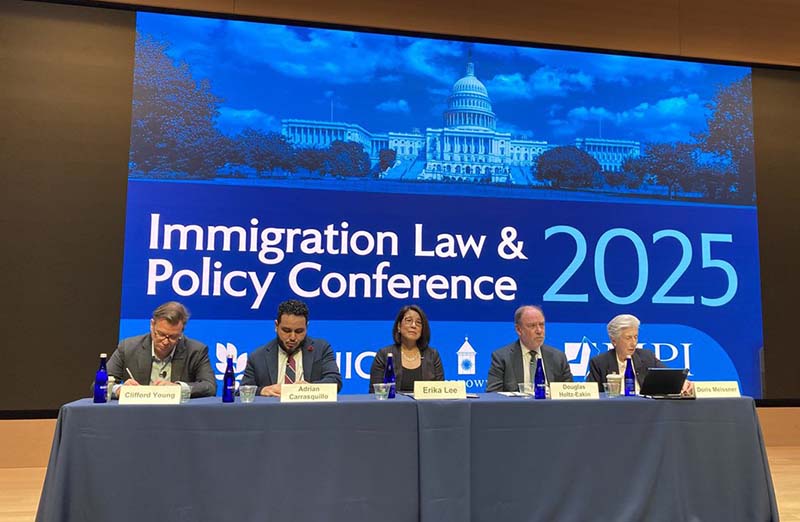WASHINGTON (OSV News) — Panelists and advocates for migration at the 22nd Annual Immigration Law and Policy Conference Oct. 9 examined challenges the Trump administration’s immigration policy presents for their cause.
The conference — organized by the Catholic Legal Immigration Network Inc., Migration Policy Institute and the Georgetown University Law Center — featured policymakers, attorneys, and immigration advocates for discussions about the impact of immigration policy on the nation, the economy, and the role of courts in the matter.
Erika Lee, a Harvard University historian, gave an overview of the history of migration in the U.S. including other times in history where there was a restrictive policy in place, suggesting that while current immigration enforcement policy presents new challenges, it is not necessarily without precedent in the U.S.
Benjamin Franklin immigration letter
Citing a letter from Benjamin Franklin that expressed concern Pennsylvania was being overrun by German immigrants, as well as periods of anti-Irish and anti-Catholic sentiment, Japanese internment camps and the rejection of the Jewish refugees on the ocean liner St. Louis during World War II, Lee said, “we have been a nation of immigrants, while at the same time, restricting, deporting and incarcerating them.”
“That’s one of the challenges in how we think about moving forward,” she said.
During a panel discussion about access to legal immigration services, Luis Guerra, director of field engagement for CLINIC, called on parish communities to be “louder” when such issues impact members of their community.
‘Loud’ anti-immigrant voices
“Usually, I think we’re seeing the loud folks be anti-immigrant voices, so being louder, being vocal (is important),” he said, adding faith communities can have a real impact when they come together.
Anna Gallagher, executive director of CLINC, praised bishops and priests who “stepped up,” citing San Diego Bishop Michael M. Pham accompanying people to immigration court hearings.
“It lowers the temperature, it lowers the political temperature, because they are accompanying their people,” she said.
Jason P. Houser, a former chief of staff at U.S. Immigration and Customs Enforcement, told the conference that “tearing down legal pathways” is one of the things that makes achieving the stated goal of border security more difficult.
Immigrant removal ‘political theater’
The concept of immigration policy that exclusively focuses on detainment and removal as “political theater,” he said, “is extremely dangerous.”
“That drives a loss of trust” in law enforcement, he said.
The role of courts in a response, panelists said, is crucial, pointing to courts blocking Trump’s executive order to restrict the practice of birthright citizenship, in the midst of a class-action lawsuit.
The Supreme Court previously limited the ability of federal judges to issue nationwide injunctions in June, but the court indicated such challenges could continue as class-action suits. The ruling may bring the issue back to the Supreme Court as the Trump administration seeks enforcement of its order.
Constitutionality of Trump’s executive order
At the time, the Supreme Court did not directly rule on the constitutionality of Trump’s executive order itself. Justice Amy Coney Barrett wrote for the majority that “when a court concludes that the Executive Branch has acted unlawfully, the answer is not for the court to exceed its power, too.”
If Trump’s order were enforced, it would end birthright citizenship for children born in the U.S. to parents without legal status or parents who are temporary visa holders.
But Omar Jadwat, director of the Immigrant’s Rights Project at the American Civil Liberties Union, said during a panel discussion that thanks to the class-action lawsuit, “not a single baby has been stripped of its right of citizenship under the Constitution.”
The order is among the Trump administration’s immigration actions that have been met with criticism from the U.S. bishops.
Catholic social teaching on immigration balances three interrelated principles — the right of persons to migrate in order to sustain their lives and those of their families, the right of a country to regulate its borders and control immigration, and a nation’s duty to regulate its borders with justice and mercy.
Kate Scanlon is a national reporter for OSV News covering Washington. Follow her on X @kgscanlon.




